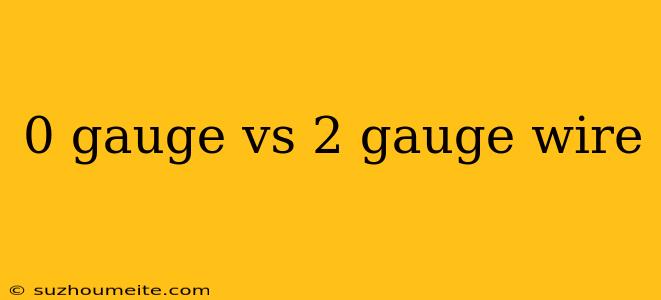0 Gauge vs 2 Gauge Wire: Understanding the Differences
When it comes to electrical wiring, the gauge of the wire plays a crucial role in determining its conductivity, durability, and overall performance. Among the various wire gauges available, 0 gauge and 2 gauge wires are two of the most commonly used options. But what sets them apart, and which one is right for your specific needs? In this article, we'll delve into the differences between 0 gauge and 2 gauge wire to help you make an informed decision.
What is Wire Gauge?
Before we dive into the comparisons, it's essential to understand what wire gauge is. Wire gauge refers to the measurement of a wire's diameter, with a lower gauge number indicating a larger diameter. The American Wire Gauge (AWG) system is the most widely used standard for measuring wire gauge.
0 Gauge Wire
Characteristics:
- Larger diameter: 0 gauge wire has a diameter of approximately 0.325 inches (8.25 mm)
- Lower resistance: 0 gauge wire has a lower resistance than 2 gauge wire, making it ideal for high-power applications
- Higher current capacity: 0 gauge wire can handle higher currents than 2 gauge wire
- Thicker insulation: 0 gauge wire typically has thicker insulation to accommodate its larger diameter
Advantages:
- Suitable for high-power applications, such as heavy-duty electrical systems, generators, and alternators
- Can handle higher currents and voltages without overheating or damaging the wire
- Provides a more reliable connection due to its larger diameter and lower resistance
Disadvantages:
- Heavier and more difficult to handle due to its larger diameter
- More expensive than 2 gauge wire
- May not be suitable for smaller applications or tighter spaces
2 Gauge Wire
Characteristics:
- Smaller diameter: 2 gauge wire has a diameter of approximately 0.258 inches (6.55 mm)
- Higher resistance: 2 gauge wire has a higher resistance than 0 gauge wire, making it less suitable for high-power applications
- Lower current capacity: 2 gauge wire can only handle lower currents than 0 gauge wire
- Thinner insulation: 2 gauge wire typically has thinner insulation due to its smaller diameter
Advantages:
- Lighter and easier to handle than 0 gauge wire
- Less expensive than 0 gauge wire
- Suitable for smaller applications, such as automotive electrical systems and speaker wires
Disadvantages:
- Not suitable for high-power applications or heavy-duty electrical systems
- May overheat or damage the wire if used in applications exceeding its current capacity
Comparison Summary
| Characteristic | 0 Gauge Wire | 2 Gauge Wire |
|---|---|---|
| Diameter | 0.325 inches (8.25 mm) | 0.258 inches (6.55 mm) |
| Resistance | Lower | Higher |
| Current Capacity | Higher | Lower |
| Insulation | Thicker | Thinner |
| Suitability | High-power applications | Smaller applications |
Conclusion
When choosing between 0 gauge and 2 gauge wire, consider the specific requirements of your project. If you need a wire that can handle high currents and voltages, 0 gauge wire is the better option. However, if you're working with smaller applications or tighter spaces, 2 gauge wire is a more suitable choice.
Remember to always follow safety guidelines and manufacturer recommendations when working with electrical wiring to ensure a safe and reliable connection.
